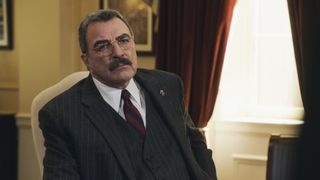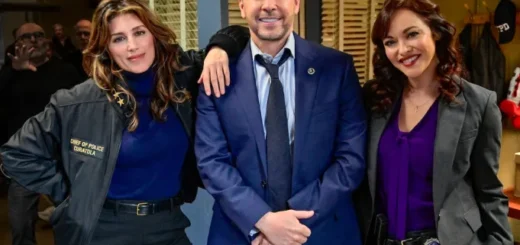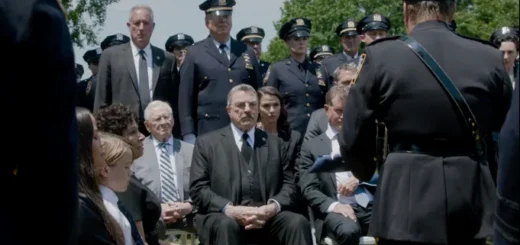“How ‘Blue Bloods’ Bids Farewell to the Reagans After 14 Seasons”
From its premiere on September 24, 2010, Blue Bloods set itself apart as more of a family drama than a typical police procedural, a theme that remained central throughout its 14-season run on CBS. The series finale, which aired on Friday, stayed true to this concept by focusing on an intense case involving the Reagan family. A notorious gang leader teams up with other gangs to stage violent attacks across the city in hopes of securing amnesty, offering a compelling yet personal storyline for the family, rather than a flashy, reflective send-off.
The case hit close to home when Eddie Janko-Reagan’s (Vanessa Ray) partner, Luis Badillo (Ian Quinlan), was killed in an ambush, making it a deeply personal mission for the Reagan family. Eddie, even from a hospital bed, refused to back down from the investigation. Meanwhile, the shooting of the Mayor added further pressure on Frank (Tom Selleck), who found himself professionally and personally entwined in the case. As always, Danny (Donnie Wahlberg) was personally affected, as was customary for his character.
Blue Bloods, created by Sopranos veterans Robin Green and Mitchell Burgess, followed the Reagan family, an Irish Catholic clan with deep ties to the NYPD. The series starred Selleck as Police Commissioner Frank Reagan, with his father Henry Reagan (Len Cariou), a retired NYPD Commissioner, playing a key role. Frank’s children—Danny, a detective; Erin (Bridget Moynahan), an Assistant District Attorney; and Jamie (Will Estes), who left Harvard Law to become a cop—also featured prominently. For many seasons, the family was haunted by the death of Frank’s son Joe, another cop, who was killed in the line of duty, a loss revisited in the finale.
Though the show focused on solving crimes and protecting the public, it was the Reagan family’s strong sense of honor and justice that defined Blue Bloods. At its core, the show celebrated the belief in doing what is right, even when it isn’t popular. Frank’s calm, ethical leadership often placed him in opposition to the NYC mayor of the moment, yet he remained steadfast in his moral compass. One of the most enduring symbols of the show was the Reagan family dinner, where Frank and Pop sat at opposite ends of the table, surrounded by their children, grandchildren, and significant others. This scene underscored the values of honor, respect, and familial love that united the Reagans—and by extension, their vision of New York City.
While the show depicted the Reagan family’s legacy in law enforcement, it also acknowledged the changing landscape of police work in the modern world. The portrayal of nepotism within the family, with Frank following in his father’s footsteps and two of his sons serving directly under him, was shown as a positive tradition. Blue Bloods painted this dynamic as an idealized version of the “family business,” where personal ties and shared values triumphed over any negative connotations of nepotism. Frank allowed his children to chart their own paths, whether it was Erin making decisions in the District Attorney’s office or Danny navigating the challenges of law enforcement.
The family’s personal dynamics also added depth to the series. Early in the show, tensions emerged, especially between Danny, the hotheaded Iraq war veteran, and Jamie, the “golden boy” striving to live up to the Reagan name. Their rivalry set the tone for many future episodes, especially as Danny frequently clashed with family members, particularly Frank. While Selleck’s portrayal of Frank was the anchor of the series, Wahlberg’s Danny often drove the plot with his actions and cases, mirroring the evolving views of police officers in American society, especially in the wake of tragic events like the deaths of Tamir Rice and George Floyd.


